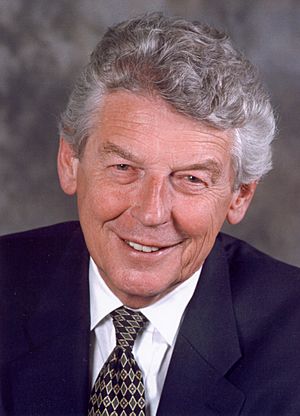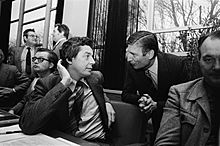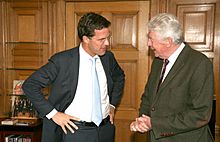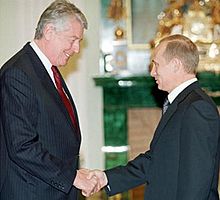Wim Kok facts for kids
Quick facts for kids
Wim Kok
|
|
|---|---|

Kok in 1994
|
|
| Prime Minister of the Netherlands | |
| In office 22 August 1994 – 22 July 2002 |
|
| Monarch | Beatrix |
| Deputy |
See list
Hans Dijkstal
(1994–1998) Hans van Mierlo (1994–1998) Annemarie Jorritsma (1998–2002) Els Borst (1998–2002) |
| Preceded by | Ruud Lubbers |
| Succeeded by | Jan Peter Balkenende |
| Deputy Prime Minister of the Netherlands | |
| In office 7 November 1989 – 22 August 1994 |
|
| Prime Minister | Ruud Lubbers |
| Preceded by | Rudolf de Korte |
| Succeeded by | Hans Dijkstal Hans van Mierlo |
| Minister of Finance | |
| In office 7 November 1989 – 22 August 1994 |
|
| Prime Minister | Ruud Lubbers |
| Preceded by | Onno Ruding |
| Succeeded by | Gerrit Zalm |
| Leader of the Labour Party | |
| In office 21 July 1986 – 15 December 2001 |
|
| Deputy | Wim Meijer Thijs Wöltgens Jacques Wallage Ad Melkert |
| Preceded by | Joop den Uyl |
| Succeeded by | Ad Melkert |
| Leader of the Labour Party in the House of Representatives |
|
| In office 19 May 1998 – 30 May 1998 |
|
| Preceded by | Jacques Wallage |
| Succeeded by | Jacques Wallage |
| In office 17 May 1994 – 22 August 1994 |
|
| Preceded by | Thijs Wöltgens |
| Succeeded by | Jacques Wallage |
| In office 21 July 1986 – 5 November 1989 |
|
| Preceded by | Joop den Uyl |
| Succeeded by | Thijs Wöltgens |
| Member of the House of Representatives | |
| In office 19 May 1998 – 22 August 1998 |
|
| In office 17 May 1994 – 22 August 1994 |
|
| In office 3 June 1986 – 7 November 1989 |
|
| Personal details | |
| Born |
Willem Kok
29 September 1938 Bergambacht, Netherlands |
| Died | 20 October 2018 (aged 80) Amsterdam, Netherlands |
| Political party | Labour Party (from 1961) |
| Spouse |
Margrietha Lummechiena Roukema
(m. 1965) |
| Alma mater | Nyenrode Business School (BBA) |
| Occupation |
|
| Signature |  |
| Military service | |
| Allegiance | |
| Branch/service | |
| Years of service | 1958–1959 (Conscription) 1959–1961 (Reserve) |
| Rank | |
Willem "Wim" Kok (born September 29, 1938 – died October 20, 2018) was an important Dutch politician and a leader of trade unions. He served as the Prime Minister of the Netherlands from 1994 to 2002. He was a member of the Labour Party (PvdA).
Wim Kok studied business administration at the Nyenrode Business School. He earned a degree called a Bachelor of Business Administration. After his studies, he became a leader in trade unions. He worked for the Trade Unions Association from 1961 to 1976. He was the chairman starting in 1972. In 1976, this group joined with another to form the Federation of Dutch Trade Unions. Wim Kok was its first chairman until 1986.
After the 1986 election, Kok became a Member of the House of Representatives. He took office on June 3, 1986. Soon after, the leader of the Labour Party, Joop den Uyl, stepped down. He suggested Kok as his replacement. Kok became the new leader on July 21, 1986. For the 1989 election, Kok was the main candidate for his party. He then formed a government with the Prime Minister at the time, Ruud Lubbers. This government was called the Cabinet Lubbers III. Wim Kok became the Deputy Prime Minister of the Netherlands and Minister of Finance on November 7, 1989.
In the 1994 election, Kok was again the main candidate. After forming a new government, he became the Prime Minister of the Netherlands. This government was called the Cabinet Kok I and started on August 22, 1994. He was re-elected in 1998 and formed the Cabinet Kok II. He continued as prime minister for a second term. In December 2001, Kok announced he would step down as party leader. He also said he would not run in the 2002 election or serve another term as prime minister. Kok left office on July 22, 2002.
After leaving politics, Wim Kok became active in business and non-profit organizations. He also worked as a lobbyist for the European Union. He wanted to see more cooperation in Europe. Kok was known for being a good manager and negotiator. During his time as prime minister, his governments made important social changes. These included legalizing same-sex marriage and euthanasia. His governments also helped reduce the national debt. On April 11, 2003, Kok received the special title of Minister of State. He continued to share his thoughts on politics until he passed away at age 80. He is remembered as one of the best prime ministers after World War II.
Contents
Early Life and Union Work
Willem Kok was born on September 29, 1938, in Bergambacht, a town in the Dutch province of South Holland. His father, Willem Kok, was a carpenter. His mother was Neeltje de Jager. He grew up in a Calvinist family and had one younger brother.
After finishing his studies in business at the Nyenrode Business Universiteit, he started working in 1961. He joined the Netherlands Association of Trade Unions (NVV). A trade union is a group that protects the rights of workers. He became the chairman of the NVV from 1973 to 1982. In 1982, the NVV joined with another union to form the Federatie Nederlandse Vakbeweging (FNV). Wim Kok was the chairman of this new union until 1986.
Political Journey
Becoming a Member of Parliament


Wim Kok was elected to the House of Representatives on June 3, 1986. This happened after the Dutch general election. Soon after, Joop den Uyl, who had been the Leader of the Labour Party for twenty years, decided to step down. Kok was chosen to take his place. He became the leader of the Labour Party in the House of Representatives on July 21, 1986. He served as the Leader of the Opposition during the time of the Cabinet Lubbers II.
Kok led his party in the Dutch general election of 1989. The Labour Party lost a few seats. However, they formed a government with the Christian Democratic Appeal (CDA). This new government was called the Cabinet Lubbers III. For the first time, Kok became part of the government. He served as both Deputy Prime Minister of the Netherlands and Minister of Finance. He held these roles from November 7, 1989, to August 22, 1994.
Prime Minister of the Netherlands
First Term: 1994–1998
In the 1994 general election, the Labour Party lost some seats. But the CDA party lost even more. The Labour Party became the largest party in the House of Representatives. After long talks, a government was formed with the People's Party for Freedom and Democracy (VVD) and the Democrats 66 (D66). This government was known as the Cabinet Kok I, with Wim Kok as prime minister. This was a big moment in Dutch politics. It was the first Dutch government since 1908 without a Christian democratic party.
The main goal of the First Kok Cabinet was to create more jobs. The Dutch economy had been struggling for years. The government allowed more market influence in the economy. This led to lower taxes and efforts to help people find work. Large building projects were also started. Another goal was to reduce the huge debt of the Dutch government. The Treaty of Amsterdam was signed during this time. His government also faced a difficult situation regarding events in Srebrenica in 1995.
In the 1998 general election, the Labour Party gained more seats. The parties in the government kept their majority. This led to the formation of the Cabinet Kok II, continuing the same policies.
Second Term: 1998–2002
The Second Kok Cabinet continued the work of the first. It was made up of the same parties: PvdA, VVD, and D66. People called it the "second purple cabinet." This name came from the colors of the parties: red for the social-democratic PvdA and blue for the liberal VVD. The cabinet aimed to continue saving money, lowering taxes, and ending unemployment. Kok was the prime minister. Annemarie Jorritsma was the deputy prime minister for the VVD, and Els Borst for D66.
This cabinet had both left-wing and right-wing political parties working together. There was not much strong opposition in the House of Representatives. However, Kok still faced some challenges. In May 1999, D66 left the government for a short time. This happened when a law they proposed about referendums was blocked. But they solved the problem through talks, and the government stayed together.
Wim Kok's second term is known for important social changes. These included legalizing same-sex marriage and euthanasia. Several other reforms were also made. In January 1999, a law called the Flexibility and Security Act started. This law made it easier for people with temporary jobs to have more security. In November 1999, a new law on working conditions came into effect. This law gave workers' councils a bigger role in making workplaces safe.
The Adaptation of Working Hours Act gave employees the right to ask for changes to their working hours. This law aimed to help both men and women balance work and family duties. On January 1, 2002, a new Work and Care Act began. This law brought together different types of leave, like maternity and parental leave. It also added new rules, such as:
- The right to change working hours if personal situations require it.
- Two days of paid leave for new fathers.
- Four weeks of leave for couples adopting a child.
- Two days of paid leave each year for urgent personal reasons.
- Ten days of paid leave each year to care for family members.
On December 15, 2001, Kok announced he would leave national politics after the May 2002 elections. He stepped down as Leader of the Labour Party that same day. Ad Melkert took his place. However, Melkert was not as popular with voters. Also, a new political figure, Pim Fortuyn, became very popular in early 2002.
On April 16, 2002, near the end of his term, Prime Minister Kok decided to resign early. This was after a report criticized his government regarding the events in Srebrenica in 1995. The other ministers also resigned. The Second Kok Cabinet continued as a temporary government. It had to deal with the murder of Pim Fortuyn. The CDA party, led by Jan Peter Balkenende, won the next elections. The temporary government stepped down on July 22, 2002, when the Cabinet Balkenende I was formed.
Wim Kok's Legacy
Wim Kok was highly praised for his ideas about a "Third Way" and the "polder model." These ideas focused on cooperation between different groups in society. He was also praised for successfully leading his "Purple Coalitions." During his time as prime minister, his governments made important social changes. These included legalizing same-sex marriage and euthanasia. They also helped the economy grow, which led to more jobs and privatization. His governments also worked to reduce the national debt. Because of these achievements and his skills as a leader, other European leaders respected Kok.
Life After Politics
After his time as prime minister, Wim Kok retired from active politics at age 63. He became a lobbyist for the European Union. He led several "high-level groups" and worked to bring European countries closer together. He also joined many supervisory boards in business and industry. These included ING Group, Koninklijke TNT Post, Royal Dutch Shell, and KLM. He also served as president of the Club of Madrid from 2009 to 2013. On April 11, 2003, he received the honorary title of Minister of State.
Working for Europe
Between April and November 2004, Kok led a review of the Lisbon Strategy. This was a plan to make the European Union more competitive. He wrote a report with ideas on how to improve this plan. The European Commission used his report to focus more on economic goals. Kok promoted the Lisbon Strategy and was appointed to the Honorary Board of the European Association of History Educators.
From 2006 to 2007, Kok was part of the Amato Group. This group of European politicians worked to rewrite a treaty for Europe. Their work led to what is now known as the Treaty of Lisbon. This treaty was created after voters in France and the Netherlands rejected an earlier version.
Family Life
In 1965, Wim Kok married Margrietha Lummechiena "Rita" Roukema. He adopted her two children from a previous marriage: a daughter named Carla (born 1959) and a son named André (born 1961). André passed away on March 30, 2022. Together, Wim and Rita had a third child, a son named Marcel (born 1966).
Passing Away
Wim Kok passed away on October 20, 2018, in Amsterdam. He was 80 years old.
Awards and Honors
| Honours | ||||
| Ribbon bar | Honour | Country | Date | Comment |
|---|---|---|---|---|
| Knight Grand Cross of the Order of Isabella the Catholic | Spain | 19 October 2001 | ||
| Knight Grand Cross of the Order of Orange-Nassau | Netherlands | 10 December 2002 | ||
| Commander Grand Cross of the Order of the Three Stars | Latvia | 15 November 2004 | ||
| Honorific Titles | ||||
| Ribbon bar | Honour | Country | Date | Comment |
| Minister of State | Netherlands | 11 April 2003 | Style of Excellency | |
Honorary Degrees
| Honorary degrees | ||||
| University | Field | Country | Date | Comment |
|---|---|---|---|---|
| Nyenrode Business University | Public administration | Netherlands | 2 September 2003 | |
| University of Münster | Philosophy | Germany | 2003 | |
Images for kids
See also
 In Spanish: Wim Kok para niños
In Spanish: Wim Kok para niños
 | Misty Copeland |
 | Raven Wilkinson |
 | Debra Austin |
 | Aesha Ash |



